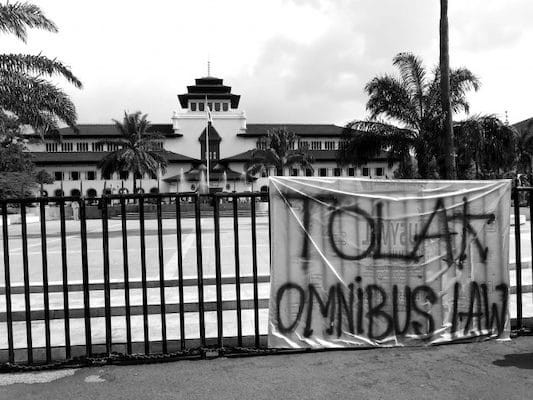The controversial legislation proposed by President Joko Widodo and supported by several celebrities, bloggers and influencers has driven into the streets of Jakarta thousands of protesting people, who claim that the law is non-compliant with the human rights and environmental concerns. The so called “omnibus law” will create new space for the investment flow and new jobs in Southeast Asia’s biggest economy, regulating 11 areas in order to boost domestic economy. But the wave of protest driven by students, workers and ecologists raised questions and caught the international attention (Randy Mulyanto ,2020, South China Post, 2020).
What is an omnibus law? The law, which president Joko referred to for the first time during his inauguration speech in October 2019, proposed to ease the access to the job creation, to create ease of doing business and land procurement for investment requirements and the imposition of sanctions. He introduced two main laws as a means of boosting investment: a law on job creation and a law on small and middle level business.
The law should help the falling economy, struggling with pandemic outcome, to attract more foreign investors. The bill changes the Indonesian’s labor regulations, from removing sectoral minimum wage to the relaxation of environmental standards. Without the Omnibus Bill, the government predicted that Indonesia would not be able to escape a ‘middle income’ trap (The Jakarta Post, 2019).
But the bill also contradicts the purpose of the bill itself, by threatening some areas because of its restrictive characteristic, with the goal of centralizing the authority of the State. For example, in the case of the environment, it poses limitations on the qualifications regarding which ‘people’ should be involved in the environmental assessment process. The current provisions stipulate that only people who are directly affected by a relevant impact of business plan will be allowed to be involved. For the Indonesian society, awareness of the impact of environmental decision- making is often lacking, and that is why environmentally aware people and organizations should be involved. Because of the lack of details, many decisions could have an impact on people’s rights linked with pollution (Kine, 2020; The diplomat, 2020).
One of the biggest issues is the weakening of the aspects of the labor protection and human rights. Several human rights groups are concerned about the influence of this law on female workers and native inhabitants who are particularly affected. Citing Amnesty International “The law will ‘harm’ workers wallets, job security and their human rights as a whole.” The Omnibus law is believed to be something that can solve regulatory problems. Many countries have successfully adopted this strategy but is not suitable for Indonesia ’s politics, because it is considered undemocratic. Amnesty International dubbed the Bill a bust for human rights, adding that it violates two international covenants that Indonesia ratified in 2005 – the International Covenant on Economic, Social and Cultural Rights, and the International Covenant on Civil and Political Rights. It will be operating through cutting labor costs, namely eliminating basic living standard components on Article 88C. This includes trimming weekends from two days to one and erasing two-month sabbatical leave for workers who have worked for six consecutive years (Article 79, Indonesian constitution).
It also removes the rights of workers for layoffs if the company abuses, insults or threatens them. In the case of women, the rights to take paid leave in case of pregnancy, labor or miscarriage are also not clearly clarified in the Omnibus law. The law would further deepen the socioeconomic inequalities. According to the Declaration on the Rights of Indigenous Peoples, which Indonesia has signed, grants indigenous peoples the right to participate in ‘decision-making matters that affect their rights’. The provisions of the law concerning both the environment and labor sectors, impede Indonesia’s progressive realization of its people’s economic, social and cultural rights and environmental protection, violating thus the international law principle of non-regression.
‘The Government’s willingness to prioritize profit over people, and business over the environment, will only lead to severe consequences in the weeks and years to come. As Indonesians continue to grapple with the impact of the pandemic, the Government of Indonesia must honour its obligations and ensure the full protection of people’s rights and the environment in accordance to national and international law,‘ said the groups from the ASEAN Intergovernmental Commission on Human Rights (FORUM-ASIA, 2020).
Impact on the environment
After the passing of the mining bill, which removed sizing limitations on mining operations, big companies could leave open vast pits that devastate communities and the environment. As already mentioned, the Omnibus law restricts the public participation on environmental issues. That would remove the primary forest protection and lead to extensive deforestation. Provinces have no longer legal requirement to maintain 30 percent of forest cover in their region. It could lead to the complete destruction of the natural forest cover, including the destruction of the remaining rainforest and the formation of plantation fires that could harm the health of the native population.
The Indonesian palm oil production is crucial for economic growth. Despite the policy “No Deforestation, No Peatland, No Exploitation”, the degrading of environmental sustainability standards opens the door for many monopolies to exploit the situation (Human rights watch,2020).
International players and their reaction on the ratification of Omnibus law
Indonesia’s palm sector is considered vulnerable for importers. The major importers like the European Union and United Kingdom are increasing the environmental and ethics standards on imported goods. More and more international firms including Tesco or Nestlé, are demanding for more strict anti-deforestation import policy. The investment warnings were sent to several players including Norway, China, the US and Japan in order to examine the Omnibus bill thoroughly, as the bill fails to protect its people and worsens the environmental crisis in the country (Kine,2020, The diplomat, 2020).
Based on the foregoing analysis, it can be seen that the Omnibus Bill in its current form would have significant impact on the Indonesian legal system, particularly with regard to issues on environmental and natural resources. It is questionable whether the aim of the Bill is in fact the tool to attract the investors who would gain many benefits during the pandemic COVID-19, instead of helping Indonesians. In summary, this Bill brings fundamental changes to the environmental protection framework of Indonesia which can lead, among others, to the destruction of the human rights of indigenous people. The law, which was supposed to help Indonesia’s recovery from the pandemic outcome, aroused a wave of mistrust in the people and the country lost its legitimacy in the eyes of international players. The game of promoting a renewable energy policy is over. There is nothing stopping the monopolies from using all the resources that the country has to offer (Sembiring , Fatimah, Widyaningsih, 2020; The Chinese Journal of Environmental Law 4, 2020).
Author: Tereza Fabuľová
Photo Source: MRonline, Neoliberal omnibus law sparks rebellion in Indonesia. 20.10.2020. Link: https://mronline.org/2020/10/20/neoliberal-omnibus-law-sparks-rebellion-in-indonesia/
References:
Article 23 section 5 and 6 of Omnibus Bill regarding the amendment of Article 25 and
26 Environmental Law (page 82–83)
FORUM-ASIA (2020), Repeal the Omnibus Law on Job Creation, abide to human rights obligations , link: https://www.forum-asia.org/uploads/wp/2020/10/1-Indonesia-Omnibus-Law-Joint-Statement-FORUM-ASIA-and-memebers.pdf
Greenpeace Southeast Asia. (2020). Warning: Omnibus Law is Threatening Indonesia’s Sustainable Investment. Greenpeace 12.8.2020, link: https://www.greenpeace.org/southeastasia/press/43752/warning-omnibus-law-is-threatening-indonesias-sustainable-investment/
Human rights watch. (2020) Indonesia: New law hurts workers, indigenous groups. (15.10.2020), link: https://www.hrw.org/news/2020/10/15/indonesia-new-law-hurts-workers-indigenous-groups
Kine, P. (2020), Indonesia’s New Omnibus Law Trades ‘Green Growth’ for Environmental Ruin. The diplomat. 14.10.2020, link: https://thediplomat.com/2020/10/indonesias-new-omnibus-law-trades-green-growth-for-environmental-ruin/
Mulyanto R. (2020). Why are Indonesians protesting the Omnibus Law if Jokowi says it will boost jobs and investments? South China morning post (20.8.2020), link: www.scmp.com/week-asia/explained/article/3098094/indonesia-says-omnibus-law-will-create-jobs-attract-foreign
OECD, ‘Improving Indonesia’s Investment Climate’, February 2011, Issue 1, p 4. link: https://
www.oecd.org/indonesia/indonesia-improving-investment-climate.pdf, accessed on
March 08,2020.
Perhimpunan Sosialis Revolusioner. (2020). Indonesia: a balance sheet of mass demonstrations against the Omnibus Law. Marxist 13.10.2020, link: https://www.marxist.com/indonedia-omnibus-law-protests-2020.htm
Ronodipuro, R. (2020). Indonesia’s omnibus law dilemma: Favorable or misfortune? Modern diplomacy, 10.10.2020, link: https://moderndiplomacy.eu/2020/10/10/indonesias-omnibus-law-dilemma-favorable-or-misfortune/
Sembiring, R., Fatimah, I., Widyaningsih, G. A. (2020). Indonesia’s Omnibus Bill on Job Creation: a Setback for Environmental Law? Chinese Journal of Environmental Law 4 (2020) 97–109
The Jakarta Post, “The main thing is not the process, but the result”: Jokowi’s full inaugura- tion speech’, Sunday, October 20 2019, https://www.thejakartapost.com/news/2019/10/20/ the-main-thing-is-not-the-process-but-the-result-jokowis-full-inauguration-speech.html



















